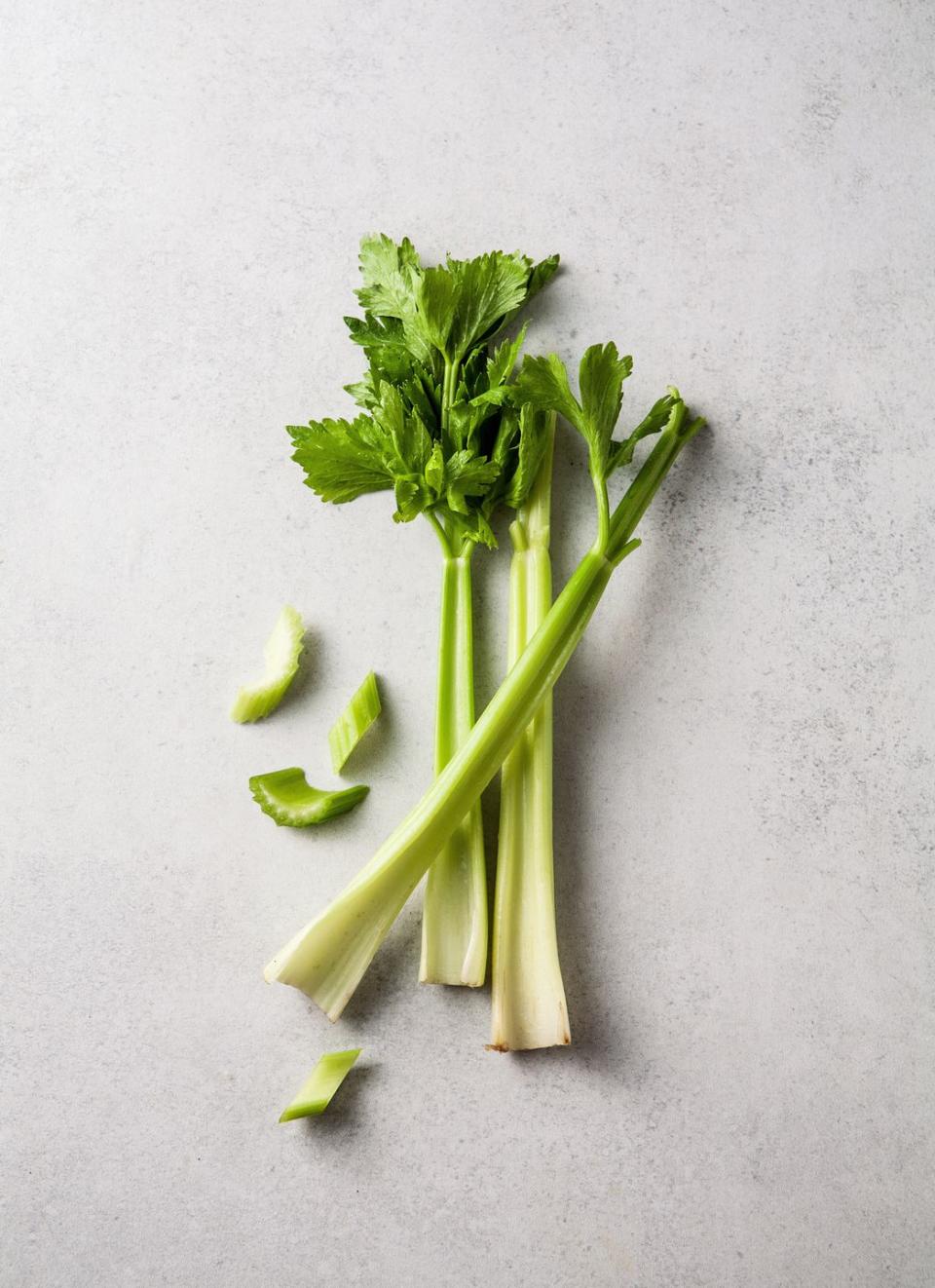Celery Juice Is Trending: But Is There Any Point?

You can't sneak a five minute commute time Insta scroll without hitting a shot of bright, fresh grass green celery juice. Glasses of the liquidised vegetable are riding high in the popularity stakes, with over 90k posts on the 'gram.
Hailed (by some) as a health elixir capable of curing innumerable ailments – Kim Kardashian revealed this week that she's downing the stuff in a bid to sort out her psoriasis – the spotlight turned on the concoction after some pretty outlandish claims about its supposed magic were made by 'medical medium,' (he claims to be able to 'read' people's health conditions) Anthony William.
Writing on Gwyneth Platrow's Goop, William, who declares on his website that he is 'the originator of the Global Celery Juice Movement,' says that: 'Celery juice is a miracle juice. It’s one of the greatest healing tonics of all time. I’ve seen thousands of people who suffer from chronic and mystery illnesses restore their health by drinking sixteen ounces of celery juice daily on an empty stomach.'
Okay. Whilst getting more greens in is forever a good shout, WH decided to ask some experts for their opinions, before getting the Nutribullet out.
Celery juice: the expert verdict
First off: what are the benefits of celery?
According to British Dietetic Association Linia Patel: ‘Although mainly water, celery is a rich source of antioxidants and phytochemicals, (such as phenolic acids, flavonols, furanocoumarins).'
'Consuming foods that are rich in antioxidants may be good for your heart health and may also help to lower your risk of some forms of cancer. Celery is also rich in vitamin K, C, A, folate and potassium and a good source of dietary fibre.'
A post shared by Jenna Dewan (@jennadewan) on Jan 16, 2019 at 2:23pm PST
So, is celery juice a magic bullet?
Patel believes that celery can't fix things solo. 'The secret in decreasing your risk of inflammatory diseases (such as cancer, diabetes, eczema) is to eat a balanced diet that is based on a combination of different plant-based foods and to live an active lifestyle.'
'Decreasing stress and sleeping helps, too.’
A post shared by Medical Medium® (@medicalmedium) on Jan 1, 2019 at 6:51am PST
Is eating celery as good as drinking celery juice?
When we juice a fruit or vegetable it removes most of the fibre. If you turn these antioxidant rich foods into a drinkable liquid, it doesn’t automatically mean it’s an easy way to up your greens. Patel explains: ‘Fibre helps control your blood sugar, manage your appetite, keep you regular and protects your heart.'
'The loss of fibre from juicing can increase blood sugar levels and lead to an unwanted peak, when compared to eating the whole fruit or vegetable. This is the reason why only one glass of juice (150ml of 100% unsweetened) counts toward one of your 5-a-day, no matter how much you drink.’

Is it better to just eat the celery?
Yes, says Patel. “I would focus on eating celery over juicing. However, I also appreciate that for some people perhaps drinking it could be one easy way to knock back some of those essential vitamins, minerals, phytochemicals (valuable plant nutrients).'
A post shared by Organic Eczema Relief (@eczemahoneyco) on Feb 9, 2019 at 7:15am PST
What is the best food to juice?
If you’re adding celery juice to a healthy balanced diet you may see some skin, hair and health benefits.
But nutritionist and founder of gpnutrtion, Gabriella Peacock believes that there are better options out there.
'I agree that celery is good for you. It has a low GI and it has anti-inflammatory properties. But, it is certainly not the best ingredient out there to see results.'
'There is nothing wrong with juicing celery, and I feel that if it gets people to juice, it is a good option. However, there are better green foods that are much more nutrient-dense than celery.'
'The basics such as broccoli, kale and wheatgrass are amazing foods with lots more payback.'

Can I trust shop bought celery juice?
Patel advises to buy with caution when you’re out and about. ‘Celery has very little sugar, it a much healthier alternative to fizzy drinks or fruit juices.'
'However, not many of us would like the taste of hard-core celery juice, which means that many manufacturers and juicing cafes will combine celery with other sugary fruits to make the final product more palatable. Make sure you read your label.' If you're at a cafe – even a healthy one – ask the staff exactly what's going in there.
Fancy taking a spin on the juice? Here's how to make it
The Clean Eating Kitchen show us how to make a cup of the green stuff without the use of an expensive juicer.
Grab two bunches of celery and cut off the base and the top of the stalks
Wash them gently in a colander
Chop the celery stalks into thirds and place them in the base of your high-speed blender
Add 1/4 cup of water and put the lid on the blender. Blend until smooth, using the tamper to push the celery into the blades if necessary
Place a clean nut milk bag over the mouth of a pitcher and pour the blended celery through the nut milk bag. Use your hands to squeeze the celery juice through the bag
Serve the juice immediately and keep any leftovers in a tightly sealed jar in the fridge
Too hardcore? Here's a blended recipe from Etelka Geczi, who is head juicer at Daylesford, Brompton Cross.
- 3 celery sticks
-handful of spinach
-handful of kale
-handful of parsley
-fresh squeezed 1/2 lemon
-1/2 cucumber
Daylesford at Brompton Cross is a juice bar serving organic plant-based drinks and smoothies, with varieties including Greens & Ginger; Matcha & Kale; Espresso & Dates; Acai & Berries.


